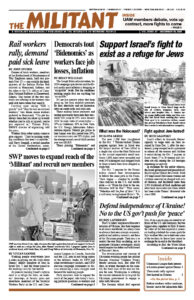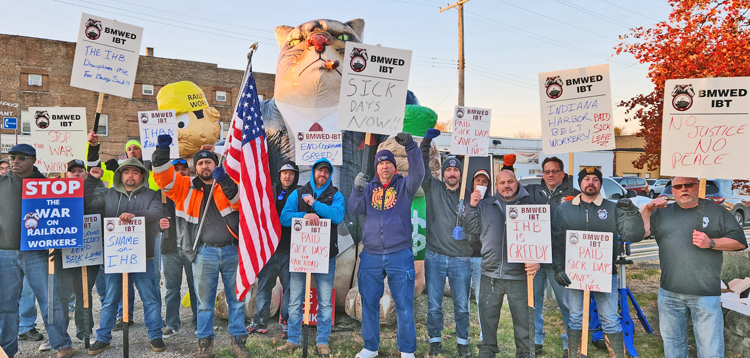Dozens of track workers, members of the Brotherhood of Maintenance of Way Employes union, held two protests Nov. 15 — one outside the headquarters of the Indiana Harbor Belt railroad in Hammond, Indiana, and the other at the U.S. offices of Canadian National Railway in Homewood, Illinois. The bosses of the two railroads are refusing to let workers take paid sick leave when they need it.
Carrying signs saying “IHB is greedy” and “Stop the war on railroad workers,” two dozen union workers picketed in Hammond. “The job has always been that you show up to work whether you’re sick or injured, you’re just expected to,” Thomas Kirby, BMWE director of organizing, told the press.
Workers from other unions came to give support. “They’re making working conditions that aren’t acceptable,” said Terry Steagall, a retired member of the United Steelworkers union. “And we’re out to change that, corporate greed needs to go away.”
The BMWE and other rail unions have taken this fight on as a priority. Paid sick leave was a key demand in the national rail contract fight last year. But the bosses refused to budge.
Rail workers are subject to the notorious anti-labor Railway Labor Act, which covers them all with massive red tape, no-strike provisions and endless delays in the fight for a contract. Last fall Democratic President Joseph Biden and Congress adopted legislation making a rail strike illegal and imposing a contract on the unions that the BMWE, SMART-TD conductors union members and others had voted to reject. It did not contain paid time off.
A separate bill to grant rail workers paid leave was submitted, but, under pressure from the rail bosses, it went down to defeat.
“To be clear, rail companies could do the right thing today and grant workers paid sick leave,” AFL-CIO President Liz Shuler said after the vote. “But they’ve refused, putting profits over people.”
The rail bosses have imposed big changes on the workers and the industry over the last several years. They’ve implemented what they call “precision scheduled railroading,” running longer and heavier trains on tighter schedules and laying off thousands of workers.
Between November 2018 and December 2020, the bosses cut 40,000 jobs, creating increasingly dangerous conditions and greater pressure on workers. An integral part of their shift was to make it more difficult for rail workers to take any time off.
This situation became front-page news Feb. 3 when a Norfolk Southern freight train with over 100 cars and 9,300 feet long derailed in East Palestine, Ohio. In an effort to get rail traffic moving again, bosses and local officials drained five derailed tank cars containing highly toxic vinyl chloride into trenches and set it on fire, spreading dangerous contamination throughout the town and surrounding area, leading to an evacuation and continuing health problems.
Fight continues
Rail workers and their unions organized protests, as did residents of the affected area. Among the steps they forced on Norfolk Southern bosses was an agreement later that month for workers to get paid sick leave.
“IHB has stubbornly refused to join roughly 80% of the freight rail carriers in this country to recognize the need of its employees to respond to unforeseen illness,” BMWE Communications Director Clark Ballew told the Northwest Indiana Times.
“All of them, not just IHB, everyone across the board, especially the freight railroads,” he said, “have whittled down their workforce so far that disasters like East Palestine happen that are dangerous to our workers and the community at large.”
Over months bosses at the country’s largest rail lines — Burlington Northern Santa Fe, Union Pacific, CSX and Norfolk Southern — have conceded paid sick leave. BMWE’s agreement with the BNSF, the largest railroad in North America, came in September.
It’s still pretty meager, four days a year with the possibility of using personal days for three additional days off without prior notice. But it’s a big step forward.
This fight is part of the broader battle by rail workers for conditions, schedules and crew sizes that are based on the need to protect the safety of workers and those who live by the tracks.
In reporting the picket lines in Hammond and Homewood, the BMWE noted their fight is “feeding off the recent resurgence of organized labor,” saying, “We will prevail.”


